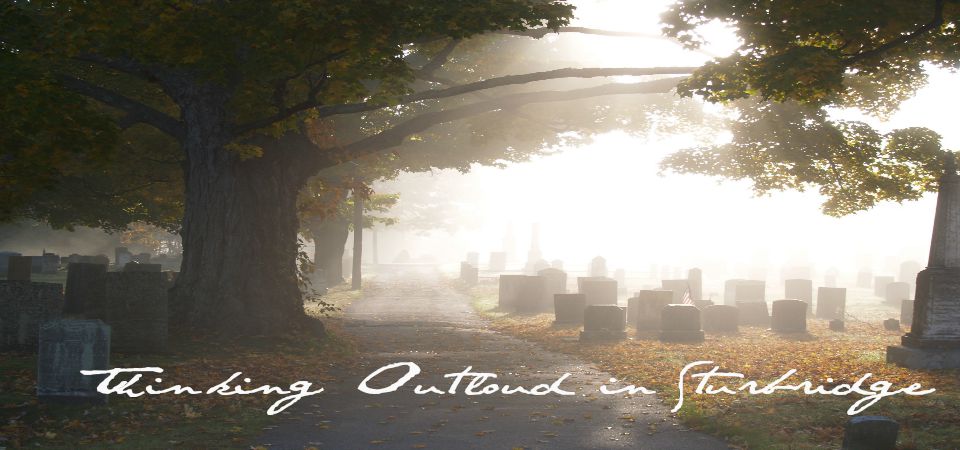Sixty miles west of Boston, Massachusetts there is the small New England town of Sturbridge. Located at the junction of I-90 (The Mass Pike), and I-84 it has become known as the "Crossroads of New England". The town was first settled over 300 years ago, and like other small New England towns it has grown just enough over the years to be in a difficult place today. How do we embrace the future without forgetting how we got to our present? How do we attract the right kind of growth, and maintain who we are? And, what about our culture out here in Central Massachusetts?
These pages will cause one to think about how to protect what we have, our future direction, and how to move on in the very best way.
Those thoughts, and other ramblings, will hopefully inspire more thought, conversation, action, and occasionally a smile...
...seems to be working so far
Tuesday, August 26, 2008
Naw. Got Another Idea?
There has been some talk about Sturbridge taking part in a program like this lately.
Not a good idea.
When the consumer buys a product, no matter what it is, they own it, and the manufacturer is out of the loop. Except for the warranty, and any safety issues that arise with the item after purchase, the manufacturer is no longer responsible to what happens to the item.
That's it.
If we start a program of having the producer of the product responsible for taking it back for proper disposable at the end of its usefulness to the consumer we will open the door to other products having to meet the same criteria.
It would start of innocently enough, but once the precedent is set, well, you know how these things go.
Think about it. Old cars that just don't run anymore. Cribs that our kids have out grown. The futon that never closes right. The jar of Helmans we left out on the counter overnight.
No. We bought it, and we own it. It is up to us to properly dispose of the items. For most items it is as simple as tossing them in the trash, or recycling them. Broken items go to the Big Dumpster in the sky, and hazardous material go to the Recycling Center where they will charge a fee to cover the disposal of items like car batteries, and cathode ray tube items. For other items there is always Craigslist.org.
It's a simple process, and it works. If the fee's charged don't cover the CRT's disposal, then charge what will cover it. Don't involve the manufacturer. If we do they will subsequently hike up the prices of the items they sell to help cover the old items disposal fee's, and it will just plain tick them off.
A few years ago when this program was talked about nationally it was all the rage, then folks thought about it more, and it went by the wayside. One doesn't have to wonder why.
If we want to make a difference, and be a little more "greener" than we currently are, then how about free mandatory household recycling? Or placing recycling bins around town? Or banning plastic shopping bags...wait, never mind.
Tried that one.
Comments are now closed on this post.

When I first heard this idea of making the manufacturer responsible for disposing of its hazardous products I though the same way as you. I thought about it more and I changed my mind. Why should communities and towns be responsible for disposing of “manufacturers” hazardous waste? Why should the consumer be responsible for proper disposal of Earth unfriendly waste? The big manufactures made it, they should be responsible for their hazardous waste products proper disposal. Maybe they won’t use as many hazardous materials in the manufacturing process; maybe they will make products that are more recyclable. Maybe they will do the Earth friendly thing! Think about it, the average person does not know what they can and can not throw in the landfill and consequently throw away all sorts of hazardous material that eventually find it ‘s way back into our soil and water supply. Put the burden on the maker.
ReplyDeleteI can see your point, Anonymous. I feel that as consumers we shoulder the responsibility of disposing of an item we have purchased. We can choose not to purchase the item, too. For those of us with old TV's and computer monitors that will soon hit the Recycling center we must pay a fee to cover the cost of dumping the item. The town is not loosing anything here. If they are, then they have to increase the fee, and as consumers, we must shoulder the cost.
ReplyDeleteThink about it, though. If we open the door for electronic makers to cover the cost of something that is no long theirs, then what next? What if the piece of folk art we bought no longer fits our decor, do we go back to the maker of the piece for them to dispose of it if the landfill says it is hazardous? I know, an extreme case, but I hope you see my point. AS consumers our duty is buy with some knowledge of what we are buying. The quality of the item, the life expectancy of the item, the price, and what happens if it breaks?
We also accept the responsibility of disposing of the item when it has outlived its usefulness.
Batteries are another thing that must be disposed of properly, but if Duracell had to retrieve all the batteries it sold, the cost would be reflected in the sale price. Besides, it would be an impossible task. Maybe having Duracell kick in some funds to assist with the recycling would be helpful, but I believe they already do that.
I just think if the manufacturer has to dispose of its own products they will make them of more recyclable and less toxic materials.
ReplyDeleteAnonymous, That is a very good point.
ReplyDelete